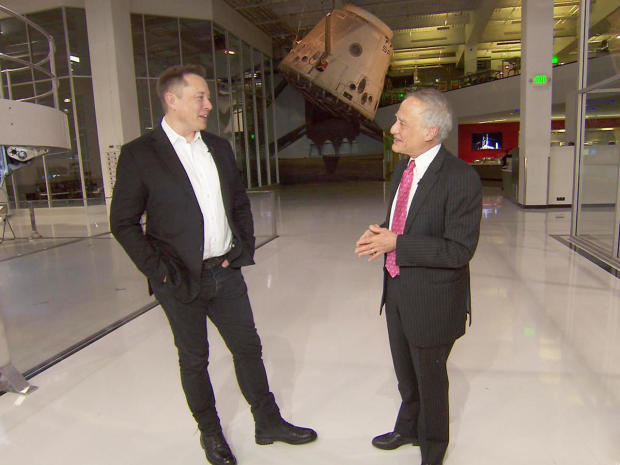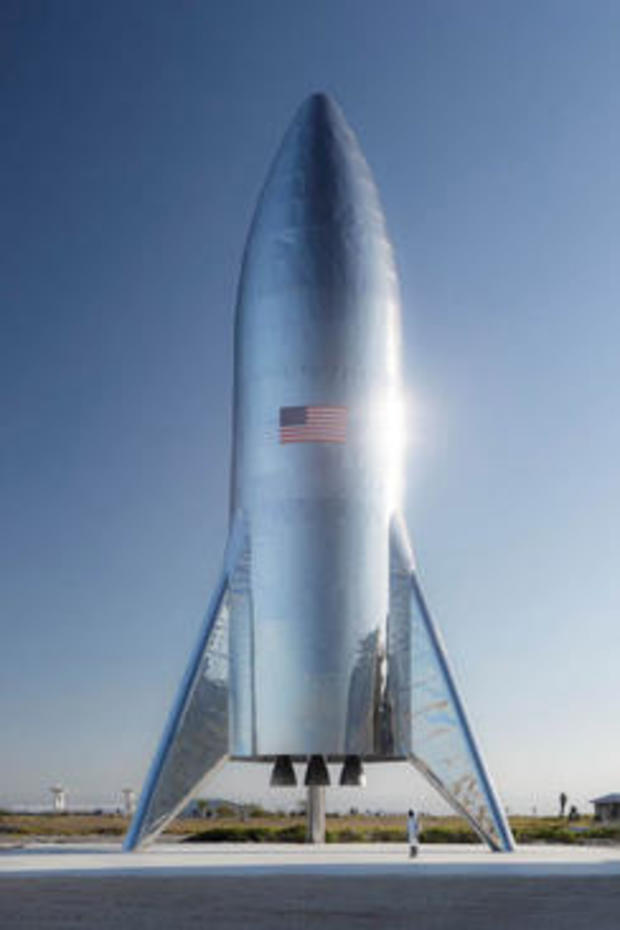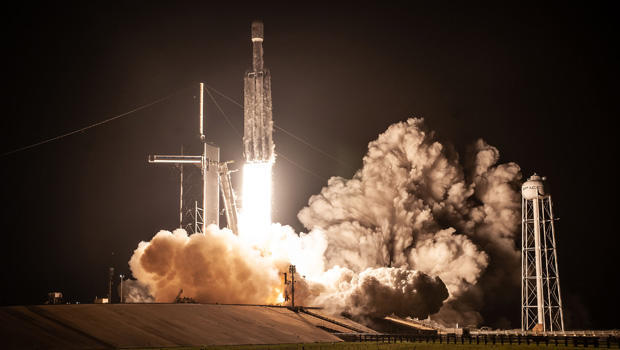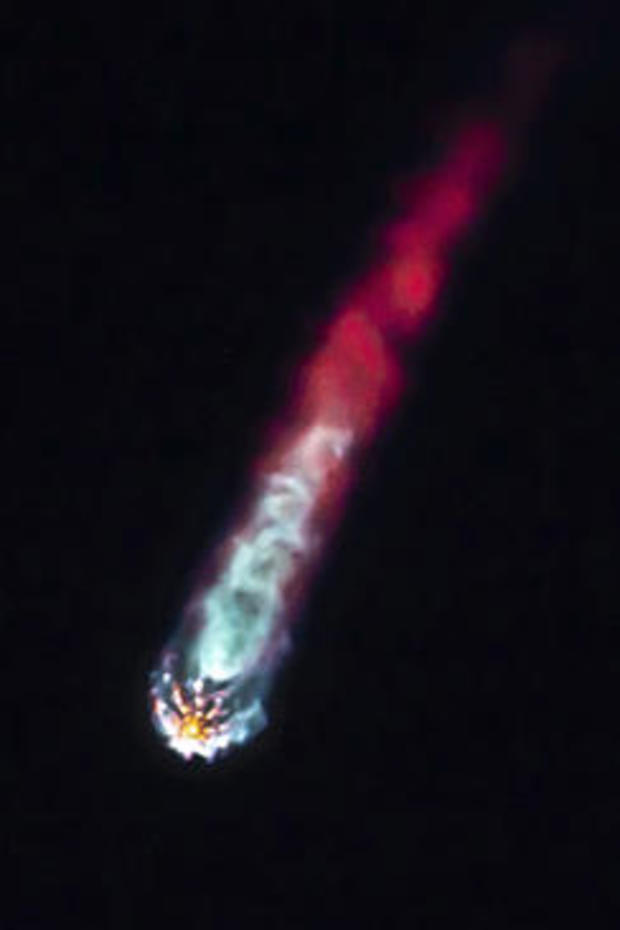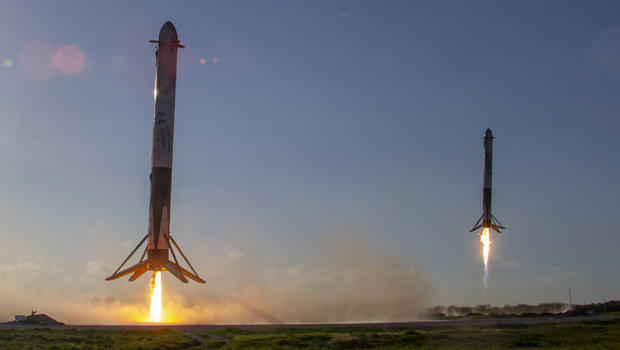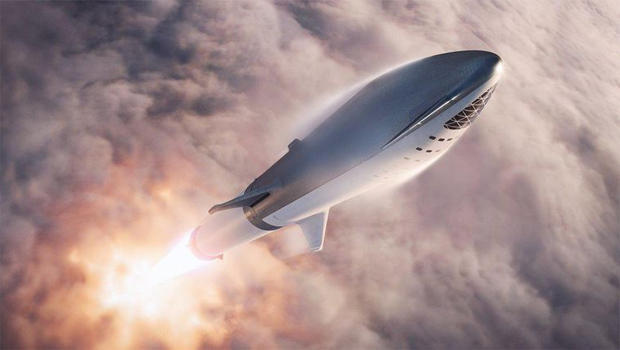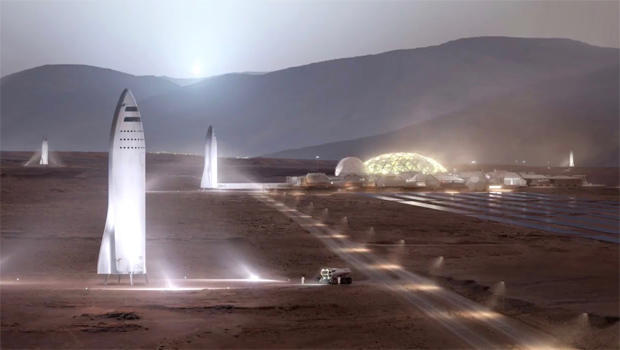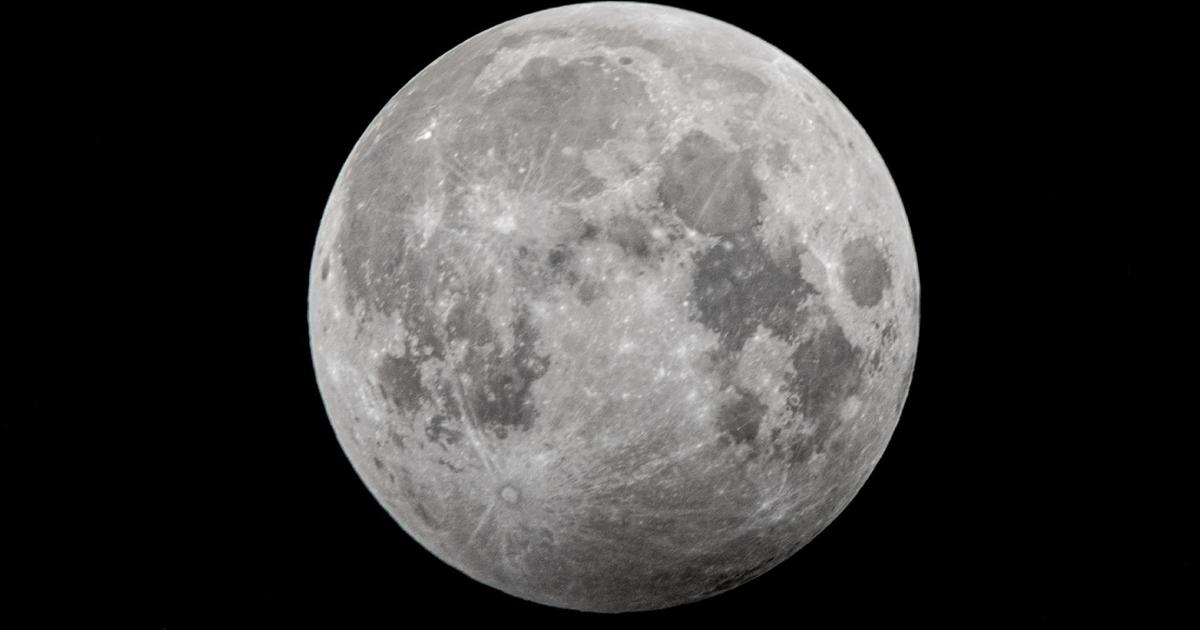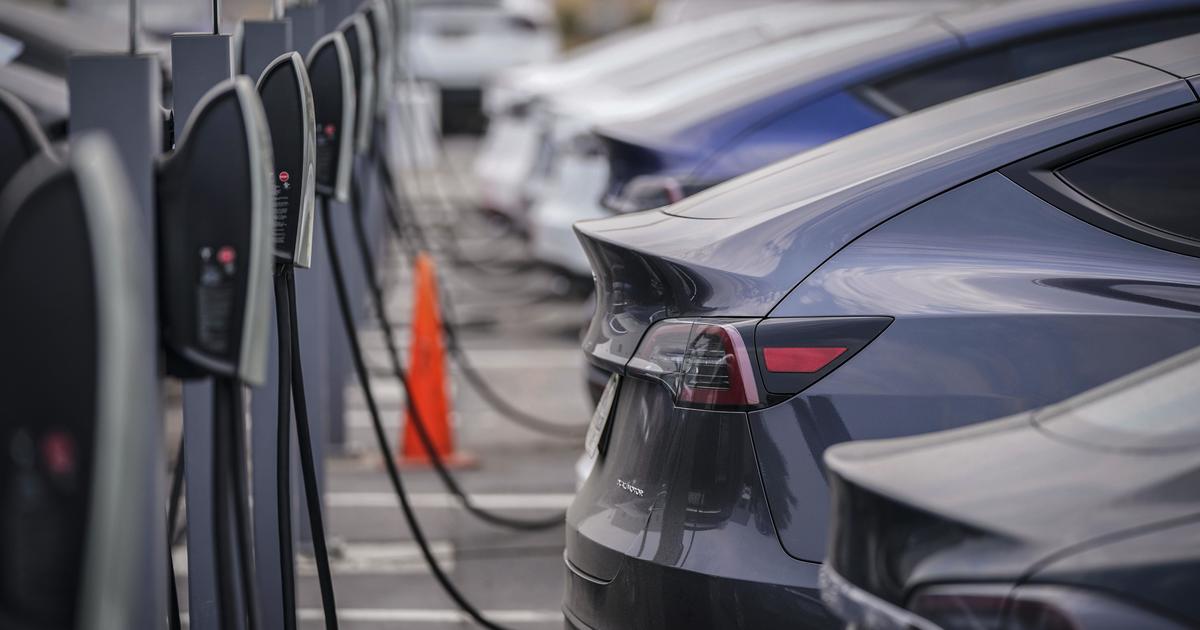Extended transcript: SpaceX CEO Elon Musk on putting boots on the moon and Mars
In this extended transcript of Time magazine editor-at-large Jeffrey Kluger's interview with Elon Musk for "CBS Sunday Morning," the founder and CEO of SpaceX discusses the aerospace company's ambitions for flying humans to the moon and Mars, the importance of reusability in rockets, the advantage sof being a privately-owned company shooting for the stars, and the inspiration of Douglas Adams.
JEFFREY KLUGER: History is usually most viscerally felt by people who lived it. If you lived World War II, you understand World War II. You came along two years after Apollo 11. And yet space seems to be in your marrow. How did you come to that passion? And did Apollo 11 particularly play a role in that?
ELON MUSK: Apollo 11 landing on the moon was probably the most inspiring thing in history. And one of the most universally good things in history. People can debate whether this or that is good but I think, just the level of inspiration that that provided to the people of Earth was incredible. And it certainly inspired me. And I think everyone at SpaceX. I'm not sure SpaceX would exist if not for Apollo 11.
KLUGER: Seriously?
MUSK: Yes. What actually inspired me to create SpaceX was, I kept expecting that we would continue beyond Apollo 11, that we would have a base on the moon, that we would be sending people to Mars. And that by 2019 probably would be sending people to the moons of Jupiter. And I think actually if you ask most people in 1969 they would have expected that.
And here we are in 2019. The United States actually does not yet have the ability to send people even to low Earth orbit. This is something that we hope to help solve with the Dragon crewed flight in about six months or so. But the United States has been without the ability to send people to low Earth orbit since I believe 2011 when the shuttle retired.
So, just year after year I kept expecting us to exceed Apollo, and we didn't. And it made me sad about the future. And I thought well at least for me and I think probably for a lot of people you wanna have a sense that the future's gonna be better than the past. And if you don't have that sense it leads to cynicism, pessimism, and just not being excited about life, about the future. When you get up in the morning, what fires you up? Like, what gets you excited about being alive? There's just not that many things. But for sure you wanna believe that we're gonna be out there as a space bearing civilization out there among the stars. And that's the thing that I get really excited about, that kind of future.
I think most people do. I mean, anyone who has an adventurous spirit I think does. And so this applies to those who have an adventurous spirit anywhere in the world. And I think arguably particularly in United States which is a nation of explorers, and is in my view a distillation of the human spirit of exploration.
KLUGER: Certainly lots of other people who love space felt that same despair, felt that same disappointment. I certainly did and yet I didn't build a space company and you did. So, what was it that made you think, "Yeah this has to be done, and I'm the guy who can do it, or at least one of the guys who can do it"?
MUSK: Well I didn't think I was one of the guys who could do it. I thought starting SpaceX would be 90% likely to fail. And the way I actually started out was, I was gonna do a philanthropic mission called Mars Oasis to land a small greenhouse on the surface of Mars with seeds in dehydrated nutrient gel that would hydrate upon landing. And you've have this incredible shot of green plants against a red background. And it thought that this would hopefully inspire the public that we need to advance space beyond what it is, what has been before and that we need to send people to Mars, and just expand our horizons, you know, do more. Actually my goal was simply to get the public excited which would get then Congress excited so that they would then appropriate more money and increase NASA's budget.
So, my goal was actually, I was gonna take half the money that I made from PayPal and essentially it would be gone, in order to increase NASA's budget and then we'd go to Mars. And then I went to Russia a couple of times because I couldn't afford the American rockets. They were too expensive. And Russia was decommissioning a whole bunch of ICBMs. So in 2001 and early 2002 I went to Russia to try to buy some decommissioned ICBMs, which sounds crazy (LAUGHS) but, you know, they're gonna throw them away anyway! So then, buying a scrap rocket, that's the only kind of rocket that I could afford, seemed like the way to go. But they kept raising the price on me.
And I also came to realize that even if we demonstrated this mission that the cost of access to space was just too high. And that even if we doubled NASA's budget, unless NASA had good options for rocket contractors, they would still not make progress 'cause it would just be more expendable rockets and we'd be at risk of a flags and footprints outcome for Mars, which is still better than not going there at all. But not as good as having a base on Mars, a base on the Moon, and ultimately a self-sustaining city on Mars.
And so I was like, okay, I gotta try building a rocket company here. I thought this was like almost certain to fail. In fact I would not let anyone invest in the company in the beginning 'cause it was like, I can't take people's money. This is gonna fail. So I actually just funded the whole company in the beginning myself. Not because I thought it would turn out well, but because I thought it would fail.
KLUGER: Now one of the sweetest spots in all the world for people who love space is pad 39A.
MUSK: It's the best pad.
KLUGER: Most historic. How could you not love it?
MUSK: Absolutely, (LAUGHS) right?
KLUGER: Apollo 11 left from there. Virtually all of the lunar landing and orbital missions left from there.
MUSK: I can't believe we get to use this pad. An insane honor.
KLUGER: And that's my question. What does that feel like? That is SpaceX's leased pad now.
MUSK: Well, we're not worthy. (LAUGHS) This pad is too good!
KLUGER: I mean, do you ever wake up in the morning and think, "I got pad 39A"?
MUSK: I mean, it's mad. (LAUGHS) What the hell? It's really great that NASA's letting us use this pad, yeah.
KLUGER: Do you talk to many of the people who are there, the controllers, the astronauts, [NASA Flight Director] Gene Kranz, Buzz [Aldrin], Neil [Armstrong], Mike Collins, Jim Lovell? Have you connected with these folks?
MUSK: Yeah, I've talked to most of them over the years. Not all but most. And probably had most interaction with Buzz. I think he's quite a big supporter of what we're doing. And he's got a good technical understanding. And so he is also quite pro-Mars I believe, yeah.
KLUGER: I'm glad you said that 'cause that brings something else up for me. You speak a great deal about the need for humanity to become a multi-world species. Not just because it appeals to human ego but because it's an existential question. The sun's gonna burn out at some point, even if we don't in some way annihilate ourselves. So we need other places to live. My two questions are, how do the moon and Mars figure into this idea? And second of all, how in the world do you focus enthusiastic followers who sometimes can't focus on the next fiscal quarter for a disaster that's gonna happen three billion years from now?
MUSK: Well, thank goodness [SpaceX] is not public, huh? If (LAUGHS) there was a disaster, oh my God.The nice thing about SpaceX is we never we think about, is a launch in a quarter or out of a quarter? We always just, what's the right move here? It never even enters our minds, what's this quarter gonna look like? You know, whereas a publicly traded company you just get beaten with a stick if things move slightly from one week to the next and one quarter to the next. It's insane. As Warren Buffet said, being a publicly traded company is like having someone stand at the edge of your property of your house and yell prices at you all day long. (LAUGHS And you're, like, what is this person doing? They're, like, manic depressive. (LAUGHS) They don't bring their meds.
Or they're, like, giving you really negative, or they could be overly exuberant. And every single day [they] just keep yelling prices at you. So it's just nutty. We certainly don't have the whole sort of short seller phenomenon, which in my view shorting should be illegal. It's a crazy anachronism.
So, we can just focus on advancing the technology, getting our launches right, and we can be heads down without distraction. That's very helpful at SpaceX. And then we're just like, how do we advance the fundamentals of a space technology? I mean, the holy grail of access to space is a fully reusable orbital rocket. And we've made significant progress towards reusability with reuse of the Falcon 9 boost aid. And that's somewhere around two-thirds of the cost of launch, maybe 70% of the cost of launch is just the boost aid stage.
And we've just recently been successful in catching the nose cone of the rocket. We that is a crazy exercise with boat that's basically a giant catcher's mitt. (LAUGHS) The actual complexity of recovering the fairing [the nose cone apparatus which holds rocket payloads being jettisoned into orbit] is so nuts. Like, I'm not sure we should've done it. We have done it. But each fairing half is like a tiny spacecraft with little thrusters on it. So when it's coming in from space it's in vacuum. And little thrusters controlling the fairing 'cause it's gotta come down round side-down 'cause that's where it's got a heat shield. It's got a thermal protection or heat shield on the outer surface but not on the inner surface. So it's gotta come down with the rounded surface coming down. And it's gotta maintain its attitude as it comes in through space. And it comes in hot. If you look at the fairing entry video you see super-heated plasma and sparks and stuff flying off of it. It's coming in at basically five times faster than a bullet from an assault rifle. It's insane.
And then it hits the atmosphere, it goes subsonic. We deploy the parachutes. And the parachute itself is a steerable parachute with actuators. So it's steering itself down and coming down on glide path. And then the boat closes a data link with each fairing half. And the boat adjusts course automatically. And then the two just maneuver to touch each other. And we only just solved that in the last launch.
KLUGER: It's like an aerial puppet show with marionettes coming down and the stage moving to catch it.
MUSK: It's insane!
KLUGER: All of this of course is with an eye towards, again, this multi-planet species idea. So, Mars is a rather sterile planet right now.
MUSK: A fixer-upper. (LAUGH) Mars is a fixer-upper of a planet.
KLUGER: It's a fixer-upper. And it does have some potential for fertility. The moon, well not so much. On the other hand the moon is in the backyard. So you can practice there. So do you see these two worlds as being some sort of tandem? Would what our unmanned probes, un-crewed probes are getting us now on Mars and what you're doing, how do you see all this working together as our first big step toward this idea of multi-planet species?
MUSK: In order for us to be a multi-planet species we must solve full reusability of rockets. In the absence of that I think the only possibility are flags and footprints 'cause it would just be far too expensive. It would be as though if in the old days ships were not reusable. The cost of an ocean voyage would be tremendous. And you'd need to have a second ship towed behind you just for the return journey. So you can imagine if air flights was not reusable, if airplanes were not reusable. Nobody would fly 'cause [each] airliner costs a couple hundred million dollars.
And people do not wanna pay that for a single journey. So this is why full and rapid reusability is the holy grail of access to space and is a fundamental step towards it, without which we cannot become a multi-planet species. We cannot have a base on the moon. We cannot have a city on Mars without full and rapid reusability. This is why we've been working so hard towards reusability at SpaceX and put a tremendous amount of engineering into achieving reusability of the boost stage and now of the fairing.
And the one piece that's missing is the upper stage of Falcon 9. That is not currently reusable. And we have no plans to make it reusable.
KLUGER: Interesting, how come?
MUSK: Because Starship is gonna be a solution. We could technically make the upper stage of Falcon 9 reusable. But it's just not the right architecture for reusability. Starship is the right architecture. You essentially need a more efficient engine than Merlin. You need a more efficient propellant mix combination. Liquid methane and liquid oxygen is just more efficient than rocket propellant grade kerosene which is basically a highly refined jet fuel.
And so, there are all these fundamental architectural things that need to change if we tried full reusability including the upper stage with Falcon 9. We wouldn't quite achieve full and rapid reusability which is, that's really like an aircraft. Like, when an aircraft lands, you only expect to refuel it, maybe replace water and food.
KLUGER: Clean out the seatbacks.
MUSK: Clean it out, yeah exactly. It minor. You aren't expecting to change the engines or repaint the aircraft or anything like that. It's just refuel, food and water and clean it out and maybe there's a few things that occasionally break. But the normal expectation is that you can re-fly the plane very rapidly. You can turn around in an hour and fly somewhere else. This is what needs to happen with rockets.
KLUGER: If the Elon Musk of 2019 could talk to Wernher von Braun and Chris Kraft and all of the heroes of the 1960s. And apart from reusability if you had one piece of advice to give them whether it was technological, spiritual, salesmanship, long-term vision, what would you tell these guys?
MUSK: Well, Wernher von Braun really knew what he was doing. I mean, his plans were for reusability. But those plans were stymied. I mean, it's so insane the way rockets work today with the exception of Falcon 9. It would be like if you got a plane and the way you get to your destination is you bail out with a parachute (LAUGHS) over the city in question and your plane crash lands somewhere. Okay, that's how rockets work today with the exception of Falcon 9. This is completely bonkers. It is so hard to make a rocket. It's about as hard to make a rocket as it is to make an advance airplane. Maybe rockets are a little harder in some ways. But not that much harder. it's just that we live in a deep gravity well. And so the technical difficulty of a fully reusable rocket is higher than the technical difficulty of a fully reusable plane. If Earth's gravity was just 10% lower fully reusable rockets would be easy.
And if it was 10% higher I think it might arguably be impossible. It's very finely balanced. So for example on Mars which has about 37% of Earth's gravity, you can go single stage, basically a single ship from the surface of Mars all the way to the surface of Earth. No booster required. But on Earth, you need a giant booster. Even though it's basically four tenths of the gravity. It's night and day.
KLUGER: Your largest goal is, not to put too fine a point on it, but to help save humanity. And I know you don't put it that way. But …
MUSK: It's not like there's a desire for appreciation or gratitude or anything like that. You don't wanna be sort of morally onerous in this situation. But really I think it's just in order to have an exciting future we must be a space bearing civilization.
The defense of reasons I think are important, you know, because being a multi-planet species, the light of consciousness will be preserved. It's far more likely or at least for a longer period of time that the light of consciousness which would continue to shine. And if we're a single-planet species, well, we're just sitting around waiting for either the self-annihilation or some external event and that'll be it.
KLUGER: But there's some people who would argue that our existential crisis at the moment is a climate crisis.
MUSK: Sure, and I'm trying to help on that, too.
KLUGER: Right, I know you are. And that's actually what I was thinking about because obviously your solar city, your solar panel cars …
MUSK: Yeah, solar Tesla, electric cars.
KLUGER: And all that's very important. But there are people who argue that the same monomaniacal (and I mean that in a good way, in the best meaning of the term) focus, the ferocious commitment and the extraordinary creativity that SpaceX brings to the work it does, if that same kind of energy, caliber, and quality of energy were brought toward developing a truly renewable, truly clean power grid, the knock-off effects in terms of the saving of the species would be more immediate and eas – well, no, it wouldn't be easy. But it would be easier to see what the endgame is in relatively short term. Do you ever think about that in those 3 a.m. hours? Maybe I could just save the planet's environment instead?
MUSK: Well, I think Tesla's actually made great progress towards a sustainable energy economy in terms of from solar to storage to electric vehicles. I think for electrification of transport Tesla's arguably advanced the cores of sustainable transport by ten years, maybe 20. Probably at least ten.
The fundamental good of Tesla I would say should be measured by to what degree has it accelerated the advent of sustainable energy. And I think it's about a decade. Maybe it's two decades. These are small numbers in the grand scheme of things. But they do matter from a total sort of CO2 capacity of the oceans and atmosphere.
And I wish there was some way to do rockets by the way without burning things. But there isn't. I mean, Newton's third law, no way around it. So balancing what is the best for humanity, well, there's just no other way to do it except rockets, whereas there is another way to do terrestrial transport, including aircraft and everything else.
Everything except rockets I wanna clean. It can be done with batteries, and will be done with batteries. It's important like to note that I think the world would move towards sustainable energy without Tesla as a catalyst. It would just get there; it would just take longer. And so what's the marginal value of effort, like, how much more could Tesla make it happen if, let's say, if I consider my own time. If I were to fully allocate myself to Tesla, how much faster could we grow versus if I don't full allocate and sort of just put my time between SpaceX and Tesla? I think the marginal value is relatively limited. I think I could maybe make it happen a couple years faster. And then you feel like you could say like the Keeling Curve of CO2 parts per million in the atmosphere, like how much of [a] dent would that make? I'd rather have a Tesla take a couple years longer and still have SpaceX 'cause I think this is the right balance for the greater good.
KLUGER: 1960s, we had a very bipolar, very binary competition. U.S./Soviet, it was very bracing. We don't have that now. But we do have a somewhat distributed one. There's the U.S. There's maybe China. There's Blue Origin. There's Virgin. There's SpaceX. Is it too unfocused? Or do you think this is helping to energize our return to the moon?
MUSK: Well I don't see a lot of progress on reusable orbital vehicles to be totally frank. There's certainly talk of such things. But the only even partially reusable orbital vehicle right now is the Falcon 9. And I hope there are others. Getting to orbit from an aircraft is actually counterproductive, I would say.
It sort of seems like it would be helpful. But it's really not that helpful. The aircraft maybe helps 2% and then all the negatives of an aircraft are minus 20%. It's like a 10x difference. For sub orbital flight aircraft is fine. But not for orbit. You know, like, Von Braun really knew what he was doing, like I said. He was not in favor of, like, trying to carry the Saturn 5 under some gargantuan aircraft.
KLUGER: Yeah, would've been a bad idea.
MUSK: A bad idea. But I think it's good what, for example, Jeff Bezos is doing with Blue Origin. You know, occasionally I'll, like, you know, rib him a little bit. But, you know, I think it's good what he's doing.
KLUGER: Do you rib him? Do you ever talk back and forth the two of you?
MUSK: Yeah, yeah occasionally make some fun.
KLUGER: Can I sit in the room for one of those calls (LAUGHS) one day?
MUSK: I mean, I think he's done a great thing with Amazon and obviously nobody's perfect. But you know, I think it's good that he's allocating a lot of resources to Blue Origin.
KLUGER: Right, right. Yeah, they're doing some good work. Very good work as you guys are.
MUSK: 16:43:30 The right general goal.
MUSK: [We're] basically taking everything we've learned from Falcon 9 and putting it into Starship. Starship is super next level.
KLUGER: It seems to be, and that a question that I would like to ask you.
MUSK: Yeah, Starship's mind-blowing. I mean, there's not even anything that's ever been proposed on on the caliber of Starship that I'm aware of.
KLUGER: You don't have to be a space geek like I am to know that you folks are building some beautiful machines. The original Falcon was sleek and lean and beautiful. The 9 is terrific. The Heavy, it's the biggest machine flying today.
MUSK: Yes.
KLUGER: You could get to the moon with maybe two Heavies, it would take, or maybe just one Heavy?
MUSK: Yeah. Well, I think you probably would wanna do it with two, but you could absolutely do it with three.
KLUGER: And in that case, I guess my question is instead of going with what you've got and saying, "Let's get ourselves to the moon in three years," you're going an even more ambitious step further with Super-Heavy, the BFR and Starship.
MUSK: Well, I think we could sort of repeat Apollo 11 and do a few, small missions, send people back to the moon. But it would be somewhat of a repeat of Apollo. And it's like, the remake's never as good as the original. (LAUGHS)
So I think, like, we really wanna have a vehicle that is capable of sending enough payload to the moon or Mars, such that we could have a full lunar base, a permanently occupied lunar base would be, I know, incredible. You know, we've got a permanently occupied base in Antarctica. And it'd be absolutely way cooler to have a science base on the moon.
KLUGER: I would agree on that, yeah.
MUSK: Yeah. It'd be super great. And so if you're having a base on the moon now you need a lotta cargo. If you look at, say, the lunar lander it was pretty small.
KLUGER: It was tiny.
KLUGER: And it was made out aluminum foil origami, basically!
MUSK: Yes, exactly. It was incredible engineering. But just very tiny. So we need something big. To have a self-sustaining city on Mars, you gotta decide, "Okay, how you gonna get a million tons to Mars?"
So that's why we're trying to build it as fast as possible. You know, I think it's generally a good idea for a company that is building technology to try to make its own products redundant as quickly as possible.
KLUGER: That's a nice idea.
MUSK: Yeah. It's, like, slightly discomforting 'cause we've put so much work into Falcon 9 and Falcon Heavy and Dragon, but actually the thing we should aspire to do is to render them redundant as quickly as possible. And we'll put them in the museum!
KLUGER: When will we start seeing regular runs to the International Space Station on a crewed Dragon? I know that the idea is when you're ready to fly safely. But do you have a target date you're shooting for now?
MUSK: To launch a crew to the Space Station? Well, this is for sure both a NASA and a SpaceX readiness thing. So from a SpaceX readiness standpoint, my guess is we're about six months [away].
KLUGER: Lovely.
MUSK: And it might be weirdly, whatever the schedule currently looks like it's a bit like Zeno's paradox. You sort of halfway there at any given point in time. And then somehow you get there. So if our schedule currently says about four months, which it currently says about four months, then probably about eight months is correct.
KLUGER: That's a good way of inverse math. But that's how these things work.
MUSK: It often works that way. You can't assume eight months, otherwise it will be 16 months. It's bizarre.
KLUGER: Larger goals, if you had to bet your house on when the next boot prints would be on the moon and when those would be SpaceX? So those may be two different questions. This is just spit-balling. What kind of timeframe do you see?
MUSK: Well, this is gonna sound pretty crazy, but I think we could land on the moon in less than two years. Certainly with an un-crewed vehicle I believe we could land on the moon in two years. So then maybe within a year or two of that we could be sending crew. I would say four years at the outside.
KLUGER: And when you say, "We," do you mean the United States or you mean SpaceX?
MUSK: Well I'm not sure, I mean, if we've got two choices, which, if it were to take longer to convince NASA and the authorities that we can do it versus just doing it, then we might just do it. I think we wanna aim to do it and then enable our capability, but it may literally be easier to just land Starship on the moon than try to convince NASA that we can. It might actually be easier to just do it. I don't know. 'Cause obviously this is, like, a decision authority that's out of my hands. But the sheer amount of effort required to convince a large number of skeptical engineers at NASA that we can do it is very high. And not unreasonably so, 'cause they're like, "Uh, come on. How could could this possibly work?" But the skepticism, they'd have good reasons for it. But the for sure way to end the skepticism is just do it.
KLUGER: Just do it, yeah--
MUSK: "Hey, look. Here's a picture of landing there right now!" (LAUGHS) That might be the better way to do it. We'll see. But I think sending crews to Mars in four years, I think that sounds pretty doable. Like, internally we would aim for two years and then reality might be four.
KLUGER: Lastly, there are gonna be feet on the moon. There are gonna be feet on Mars. Could they be yours one day?
MUSK: I would like to go to the moon and Mars. I think that'd be quite fun. But I need to make sure, like, the overarching goal here is help make life multi-planetary. This is not some sort of personal quest to go to the moon or go to Mars. My sort of philosophical foundation is in line with Douglas Adams, "The Hitchhiker's Guide to the Galaxy." Everyone has their sort of favorite philosopher, but my favorite philosopher is Douglas Adams.
KLUGER: That's a good one to have.
MUSK: Well, he's dead now, but he's got a (LAUGHS) great attitude, and he's fun guy and a good sense of humor. And what he was essentially saying is, "The universe is the answer; what are the questions?"
KLUGER: Lovely.
MUSK: And if we expand the scope and scale of consciousness, then we are better able to understand what questions to ask. We'll learn more, we'll become more enlightened. And so we should try to do the things that expand the scope and scale of consciousness. And becoming a multi-planet species and ensuring that we have a sustainable climate on Earth, these are very important to that overarching philosophy. So that's the philosophy I buy into.
KLUGER: It's a good one. And it holds a lotta potential for the future of the species.
MUSK: Right.
For more info:
EDITOR'S NOTE: Due to transcription errors, the names of Wernher von Braun and Chris Kraft were originally mis-spelled. We regret the errors.
